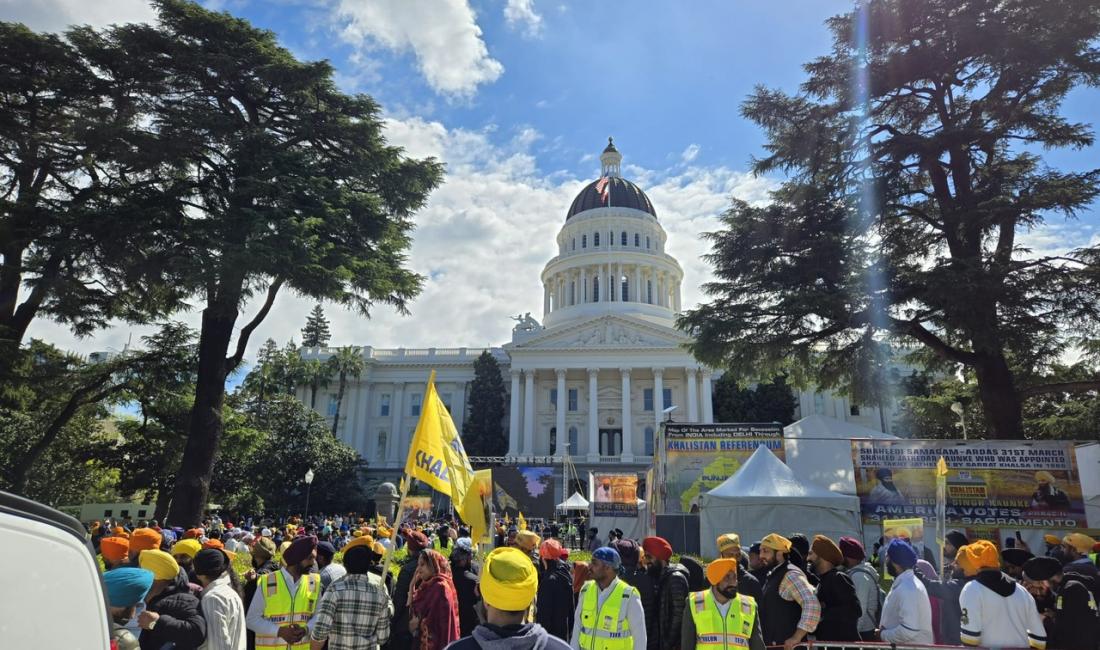Don't underestimate Turkey, Ukraine, or democracy cities.
Photo Credit: California’s State Capitol hosted the latest Khalistan Referendum on Easter Sunday. By Dane Waters
This is the latest edition of the twice monthly newsletter and roundup of Democracy Local. To subscribe to the newsletter, please register here.
When people talk about growing authoritarianism in countries, Turkey often ranks high on the list.
But it also should rank high in democratic advances. One essential fact of democracy is that it can grow and shrink in the same place and the same time.
The difference in Turkey is level of government. Yes, the autocratic rule of Recep Erdogan has been bad for democracy at the national level. His government has also sought to favor more conservative Islamic traditions. But that same autocracy is inspiring democratic innnvation and progress at the local level.
One sign of Turkey’s local democratic progress were the triumphs of highly democratic opposition candidates in the races for mayor of three major cities: Istanbul, Izmir, and the capital of Ankara. All three victors have pledged more democracy and more collaboration between cities. They were part of a wave of opposition victors, many of them women, as Reuters notes here.
These victories were considered upset by international media, but they shouldn’t have surprised anyone. Istanbul has long been a leader in local democratic practice, particularly around participatory budgeting and neighborhood consultation. Ankara has had a citizens council so effective that a book was written about it.
And Izmir was a finalist to be the next capital of European Democracy; the title went to Vienna this time, but look for that lovely citizen in Turkey’s west to win the crown next time.
BOGOTA AND BARCELONA ARE DEMOCRATIC COUSINS
If you missed Democracy Local’s second ever event, presented by the Berggruen Institute, it’s available now on Youtube (in English and Spanish). Two panelists from Bogota and two from Barcelona (and one currently in Italy) talked about what it means to be a democratic city. The essence is the participation of everyday residents in decision-making, panelists agreed, but the two cities pursue such democratic participation in different ways.
SEE YOU IN BUCHAREST
Democracy Local is headed to the Romanian capital, Bucharest, for the week of May 13 to report on the 2024 Global Forum on Modern Direct Democracy. We’ll be focused on interviewing attendees about their experience with, and ideas for local democracy. The Forum is free and open to all; you can register at 2024globalforum.com.
UKRAINE SHOULD HOLD LOCAL ELECTIONS.
Ukraine did not hold its scheduled March 17 national elections, and for good reasons, as Kyiv critic and journalist Daria Bodior writes at Zócalo Public Square (where I’m democracy editor).
Russia is relentlessly pursuing its war against the country, and voters and elections very well could have been targets of Putin. Ukrainian law prohibits elections to not happen during a time of martial law.
All that said, it’s possible to conduct local elections safely, even in the midst of war and occupation.
I know that because Ukrainian cities have done this before.
In an extraordinary story in The Counteroffensive, Myroslava Tanska-Vikulova, Oksana Ostapchuk , and Alessandra Hay recount the secret election in Mariupol in 2014. Even with Russian troops occupying the city, and the Russian flag flying over government buildings, activists and election officials managed to hold a vote for president.
The story involves a secret train shipment of ballots into the cities, setting up precincts privately, and election officials disguising their work by dressing in traditional Ukrainian vyshyyankas.
Today, a main player in the secret election says she supports not holding in this time of war. But she also says that local democracy is dead without the people’s consent. And it’s hard to maintain support for war without democracy. Before long, Ukraine must find ways to allow its people to choose their representatives, at least in the communities where they are enduring this war.
NIÑOS OF NUEVO LEÓN
The International Observatory of Participatory Democracy is offering peer learning sessions on different topics. A recent one looked at youth participation. This slide presentation from Nuevo León state, Mexico, and its 51 municipalities does a marvelous job of outlining all the different things that a local or regional government does when it wants children to be part of its democracy.
THE LAST LOCAL FRONTIER OF THE LAST FRONTIER
When Alaska joined the U.S. union in 1959, the framers of its state constitution believed they had developed a revolutionary framework for local democracy by guaranteeing “maximum local self-government with a minimum of local government units. In the Last Frontier, people in large local “boroughs” would govern themselves.
Boroughs occupied the space between the state and its various cities, much like the traditional American county. All the boroughs are organized—which means they are run by a borough assembly of locally elected officials—except one.
The “Unorganized Borough” consists of all the land that is not organized, and thus not incorporated. It has no government at all. Which is extraordinary, since the unorganized borough covers 50 percent of Alaska’s land and is home to 10 percent of its people. A new paper on the unorganized borough calls it “the only unincorporated county-equivalent area in the entire United States.”
This void was never supposed to be permanent. But now in its seventh decade, the unorganized borough represents a wholly different model of rural government. Various and informal local institutions proliferate to handle things. And residents have come to like the lack of local taxes that comes with being unorganized; unorganized borough residents get public education services but those are paid by the taxes of organized boroughs.
A new law article from Duke University challenges this status quo—and argues that the state must incorporate—that is, organize—the unorganized borough.
GREAT READS
I wholeheartedly recommend Children of a Modest Star: Planetary Thinking for an Age of Crises, a brand new book from my Berggruen Institute colleagues Jonathan Blake and Nils Gilman. It offers a compelling vision of planetary governance, to solve the world’s biggest problems, that is grounded in a more robust local democracy. You can find it here.
Democracy is a tough plant, not a delicate flower, and it can grow in some harsh environments. One of these is Northern Styria. In a powerful story in NOEMA, Elizabeth Flock writes from Tal Tam Tamr Syria about the democratic and feminist revolution in the Rojava region. It’s well worth your time.
FOR CIVILITY, AGAINST POLITENESS
Smart interview in Persuasion with Alexandra Hudson, an Indiana-based author of a new book on civility. She talks about people confusing politeness and civility in democratic contexts. “Politeness is etiquette, it's manners, it's technique, it's external. And that sort of tone policing, compliance with norms and protocol and propriety, has been a tool of silencing discussion and oppressing minorities and dissenting voices. But civility—again, this disposition of the heart—is different than just mere superficial compliance with etiquette norms.” Civility is the tone of, for example, civil disobedience
DEMOCRACY TYPOLOGY: “SCHOOL DEMOCRACY”
As a child, did you ever dream of leading a revolution to overthrow the administrators of your own school? Me too. While our history lessons were all about the essence of democracy, our schools were anything but democratic. A few adults made the rules. Kids didn’t have a vote or any institutional say in how the school was run.
Today, all over the world, schools are being designed to be democratic. A new open access book, Designing Democratic Schools and Learning Environments: A Global Perspective, collecting examples from Egypt to Japan.
TOUGH WORDS FROM BRUSSELS
“The best advertisements for these processes is the outcome, a real outcome,” said Brussels regional MP Pepjin Kennis, at a recent panel moderated by my Berggruen Institute colleague Marjan Ehsassi.
Kennis was talking about citizens assemblies and other mini-publics, which are being used more often around the world. This expansion is being celebrated, especially in Brussels, which has been honored for its democratic progress. But Kennis complains that the assemblies often don’t change very much. And that’s because these lottery-based processes often are non-binding. At best, recommendations from assemblies go to the government, or to the people, or both, for approval
He says that assemblies still feel “marginal” in Brussels, adding ‘the policy impact is very limited these days for these deliberative committees because they’re not binding.” Watch the whole panel here.
DEMOCRACY QUOTE OF THE WEEK
“Why do we have democracy? Because there are some issues that affect us all. Because there are a lot of us and we have to get along.” – Iain Walker, newDemocracy Foundation (Australia), at the Global Innovations in Democracy: Parliamentary Exchange in Washington D.C. this month




